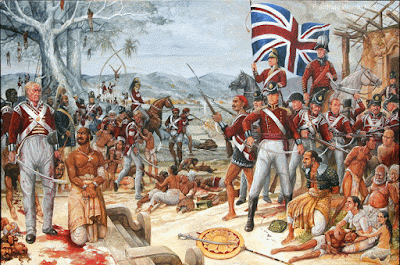Hello readers,
This blog is part of my thinking activity in which we have to write How is the native represented by Colonizers and character study of Friday in Robinson Crusoe. To understand this, we have to understand power and knowledge theory which is given by Michael Faucult. In this theory Michael Faucult said that how power create knowledge. So, the colonization of Africa by European powers had negative impact on the continent. The European always believed that, African people or countries are uncivilized countries or Africans did not traditionally have formal educations systems.
In Robinson Crusoe, we can see the character of Friday.
Robinson Crusoe is a novel by Daniel Defoe. It is about the survival of Crusoe in an unknown Island and he met Friday. In the novel we can see the politics of naming and how crouse gave him his language and culture as well. Crusoe always believed that Friday is uncivilized and he had no idea how to deal with other people. So, Crusoe identifies native of the Island as Friday and becomes crusoe's slave because he saved Friday's life. Here we can see master - slave relationship between Crusoe and Friday. So here we can see that how is Native represented by Colonizers.
In 'Grain Of Wheat' by Ngiugi Wa Thiango, we can see that how colonized represented Colonizers. Ngiugi Wa Thiong’o, himself a native Kenyan, uses this context and development of his characters to explore the moral aspect of colonization from both the perspective of the British and rural Kenyans. As we believe that colonized people is always struggle for freedom. Both the colonizer and the colonized see themselves as the Equitable, heroic figure working for the good of humanity. We can see the character of John Thompson and Kihika. Thompson is the English regional governor and he believing it to be a moralizing and purifying force of human progress. On the other hand, we can see the character of Kihika who is a young Gikuyu man. He raised on stories of British oppression and injustice. Kihika observes how the British have forced the Gikuyu tribe.
Quote......
This blog is part of my thinking activity in which we have to write How is the native represented by Colonizers and character study of Friday in Robinson Crusoe. To understand this, we have to understand power and knowledge theory which is given by Michael Faucult. In this theory Michael Faucult said that how power create knowledge. So, the colonization of Africa by European powers had negative impact on the continent. The European always believed that, African people or countries are uncivilized countries or Africans did not traditionally have formal educations systems.
In Robinson Crusoe, we can see the character of Friday.
Robinson Crusoe is a novel by Daniel Defoe. It is about the survival of Crusoe in an unknown Island and he met Friday. In the novel we can see the politics of naming and how crouse gave him his language and culture as well. Crusoe always believed that Friday is uncivilized and he had no idea how to deal with other people. So, Crusoe identifies native of the Island as Friday and becomes crusoe's slave because he saved Friday's life. Here we can see master - slave relationship between Crusoe and Friday. So here we can see that how is Native represented by Colonizers.
In 'Grain Of Wheat' by Ngiugi Wa Thiango, we can see that how colonized represented Colonizers. Ngiugi Wa Thiong’o, himself a native Kenyan, uses this context and development of his characters to explore the moral aspect of colonization from both the perspective of the British and rural Kenyans. As we believe that colonized people is always struggle for freedom. Both the colonizer and the colonized see themselves as the Equitable, heroic figure working for the good of humanity. We can see the character of John Thompson and Kihika. Thompson is the English regional governor and he believing it to be a moralizing and purifying force of human progress. On the other hand, we can see the character of Kihika who is a young Gikuyu man. He raised on stories of British oppression and injustice. Kihika observes how the British have forced the Gikuyu tribe.
“from early on, he had visions of himself, a saint, leading Kenyan people to freedom and power.”
The novel ends on the day of Kenya’s independence from Britain. So in the novel we can see the conflict between colonizer and colonized.
"The whiteman told of another country beyond the sea where a powerful woman sat on a throne while men and women danced under the shadow of her authority and benevolence. She was ready to spread the shadow to cover the [Gikuyu]. They laughed at this eccentric man whose skin had been so scalded that the black outside had peeled off."

Well sequenced and well organized content. Keep writing!
ReplyDelete